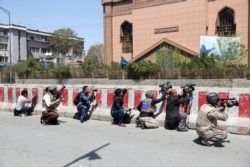A Kabul-based media watchdog on Wednesday chastised Afghan government officials for failing to finance and implement existing information access laws throughout the country.
Speaking to reporters a day after 30 local media outlets issued an open letter criticizing Kabul's "severe" restrictions on government-held information, Sayed Ikram Afzali of Integrity Watch Afghanistan said government efforts to curtail access is part of a growing problem.
"The institutions that consider themselves the protector and implementer of laws must not think of themselves as being above the law — and that includes the Attorney General's office, the Afghan Parliament, and the government of Afghanistan," he said. "If these institutions fail to give us the information, where should we go to get the information?
"Throughout my tenure as the chief information commissioner," he continued, "I have witnessed the media's access to information being restricted by key government institutions. Unfortunately, the trend continues."
On Tuesday, representatives from dozens of domestic Afghan news outlets gathered at a site designated for the construction of a memorial to Afghan journalists slain in the line of duty to air grievances about Kabul's "double standard" when it comes to "implementing the access to information law, and supporting free media."
"Despite the fact that Afghanistan is one of the deadliest places to be a journalist, Afghan media is still the freest in the region," their letter states, "but carelessness of the government has endangered this hard-won achievement."
Afghan officials responded within hours of the protest, beginning with tweets by Sediq Sediqi, President Ashraf Ghani's spokesperson, who defended Kabul's "unmeasurable commitment and resolve toward safeguarding our media freedom."
Speaking live on-air at VOA's Kabul studio, Ghani's deputy spokesperson, Dawa Khan Meenapal, requested more detailed information about specific incidents of restricted access to government-held information.
"Clarifications are needed," he said. "[Journalists] mentioned recent years in their statement, [but] we do not know how many years — one, two, three or 10. These need to be discussed. We should know how much they sought information and from which government agency.
"... We need a fundamental discussion," he added. "We welcome media's every voice. We need to discuss on all those issues where they see problems."
A statement issued Wednesday from the presidential palace announced the creation of "a hotline for international and local media to call" if requests for information are neglected.
'Many challenges'
Some journalists, however, remained skeptical.
"I am working on a case and have been trying to contact Attorney General's Office for more than a month to get information about this case," Afghan journalist Deena Samadi told VOA. "They have blocked my personal phone number as well as our office's phone numbers. They simply told us that they have nothing to say about this case. So as you see, we are facing many challenges."
Added Zahra Sotooda, "The spokespersons share the information with us, [but] the problem is that, content-wise, what they share with us is too broad. We need to have access to details, in particular, when we work on reports on corruption, peace talks or some government organizations."
Ainuddin Bahaduri of Afghanistan's Access to Information Commission, however, was quick to reject the criticism, insisting that his organization takes such allegations of neglect seriously.
"If you [journalists] are denied access to information, you have the right to file your complaint to the commission," he said, adding that his officials will then review each complaint "in accordance with the law" and grant "access to requested information if possible."
Waheed Omar, an adviser to President Ghani, assured reporters at a Wednesday press conference that Afghan officials support a free press.
"Our intention is to share exact and transparent information with the media in a timely matter," he said. "As representatives of Afghan government's public affairs, there is not any restriction on us by the leadership with regard to not giving the information [to the media]."
Researcher Mohammed Nasser Timori of Integrity Watch Afghanistan, however, was quick to detail instances of recently blocked requests for information.
"Investigative reports by media on budget and Code 91," he said, referring to an ongoing probe of alleged embezzlement of two government emergency funds before ticking off a litany of other examples.
"Corruption cases; elections; TAPI project [Turkmenistan–Afghanistan–Pakistan–India Pipeline]; accusations of sexual abuse; money spent on peace talks, [Loya] Jirga [grand consultative tribal assembly], and other topics that were produced in the form of investigative reports by the media that were not followed up by the government," he said.
Ongoing violence
Tuesday's rally for expanded access to government-held information comes amid a wave of violence as Afghan troops backed by U.S.-allied forces struggle to break the Taliban's hold over roughly half of the country.
The Taliban stage near-daily attacks targeting Afghan forces, officials, or anyone who appears loyal to the government, as U.S. envoy Zalmay Khalilzad engages militants in on-again, off-again attempts to negotiate an end to the country's 18-year war.
Even as some Afghan officials concur that access to information remains a pervasive challenge for Afghanistan, they justify existing limitations by the persistent dangers and violence the country faces and warn that a return of the Taliban regime could do away with many hard-won freedoms.
On Tuesday, Ross Wilson, Chargé d'Affaires of U.S. Embassy Kabul, posted tweets saying "information is a vital resource of any free & open society," while Paris-based Reporters Without Borders, known by its French acronym RSF, expressed "deep concern about the deterioration in access to government-related information in Afghanistan."
London-headquartered Amnesty International on Wednesday said the Afghan government "must respect, protect and fulfill the right to information."
Afghanistan is among the most dangerous countries in the world for reporters. In January, the Afghan Journalists Safety Committee reported that five journalists were killed in 2019 in the country. The year before, 17 journalists and media workers were killed in Afghanistan, when a total of 121 cases of violence against journalists and media workers were reported.
During an attack in April 2018, nine journalists who rushed to the scene of an explosion in Kabul were killed by a second suicide bomber. A 10th journalist was killed the same day, shot in eastern Khost province.
RSF ranks Afghanistan 121 out of 180 countries in its 2019 World Press Freedom Index, a three-point drop from its 2018 ranking, which was "the deadliest year since the fall of the Taliban regime in 2001."
This story originated in VOA's Pashto Service. Ekram Shinwari contributed reporting. Some information is from AP.





